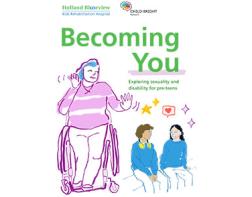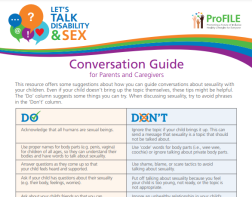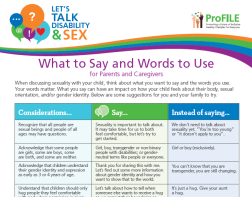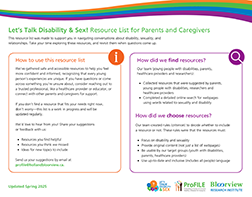Welcome to our parent and caregiver resource page!
Here you will find books, guides, and infographics to help inform conversations about sexuality with youth with disabilities. These resources were created with young adults with disabilities, parents of children with disabilities, educators, researchers and healthcare providers.
Plain text guides
Click on the drop down sections to access plain text versions of some of the PDF resources shown above.
Conversation Guide for Parents and Caregivers
This resource offers some suggestions about how you can guide conversations about sexuality with your children. Even if your child doesn’t bring up the topic themselves, these tips might be helpful. The Do column suggests some things you can try. When discussing sexuality, try to avoid phrases in the Don’t column.
Do acknowledge that all humans are sexual beings.
Don’t ignore the topic if your child brings it up. This can send a message that sexuality is a topic that should not be talked about.
Do use proper names for body parts e.g. penis, vagina for children of all ages, so they can understand their bodies and have words to talk about sexuality.
Don’t use code words for body parts e.g. wee wee, coochie or ignore talking about private body parts.
Do answer questions as they come up so that your child feels heard and supported.
Don’t use shame, blame, or scare tactics to avoid talking about sexuality.
Do ask if your child has questions about their sexuality e.g. their body, feelings, worries.
Don’t put off talking about sexuality because you feel your child is too young, not ready, or the topic is not appropriate.
Do ask about your child’s friends so that you can talk about developing healthy relationships.
Don’t ignore an unhealthy relationship in your child’s life, even if they only have a few friends.
Do talk positively about people of all genders and sexual identities. Show representation of LGBTQ2S+ and gender diverse people through media, discussions, etc.
Don’t talk only about heterosexual relationships.
Do ask if your child wants to talk about their gender identity or sexual orientation. Although, your child may not want to use a label at all.
Don’t assume your child’s gender identity or sexual orientation or force them to choose a category/label to fit into.
Do ask how they like to express their own gender.
Don’t expect your child to wear clothing that they may not feel comfortable in.
Do talk about teen dating and acknowledge the dating experiences of family members and/or friends.
Don’t ignore teen dating and treat it as funny or not important, nor assume your child is not dating because they haven’t asked your permission or told you about it.
Do teach skills using practical examples e.g. teach hygiene by using hands on learning, visit a sexual health clinic together.
Don’t assume your child does not need the skills.
What to Say and Words to Use for Parents and Caregivers
When discussing sexuality with your child, think about what you want to say and the words you use. Your words matter. What you say can have an impact on how your child feels about their body, sexual orientation, and/or gender identity. Below are some suggestions for you and your family to try.
Considerations
Recognize that all people are sexual beings and people of all ages may have questions.
Say sexuality is important to talk about. It may take time for us to both feel comfortable, but let’s try to get started.
Instead of saying we don’t need to talk about sexuality yet. You’re too young or it doesn’t apply to you.
Considerations
Acknowledge that some people are girls, some are boys, some are both, and some are neither.
Say girl, boy, transgender or non-binary people with disabilities or gender neutral terms like people or everyone.
Instead of saying girl or boy exclusively.
Considerations
Acknowledge that children understand their gender identity and expression as early as 3 or 4 years of age.
Say thank you for sharing this with me. Let’s find out some more information about gender identity and how you want to show that to the world.
Instead of saying you can’t know that you are transgender, you are still changing.
Considerations
Understand that children should only hug people they feel comfortable with and where permission is given on both sides.
Say let’s talk about how to tell when someone else wants to receive a hug so we respect their boundaries as well. I will also ask family members or friends to ask for your permission before hugging or touching you.
Instead of saying it’s just a hug. Give your aunt a hug
Considerations
Accept that having relationships and friendships can help prepare children for later dating and is part of healthy social and emotional development.
Say how do you know if someone is a good friend? How do you show someone that you care about them?
Instead of saying don’t tell your friend that they upset you. They may not want to be your friend anymore.
Considerations
Recognize that all children and teens are different. They will grow and develop at their own pace.
Say good question. I’m glad you asked. This is new to me so let’s find out together.
Instead of saying your brother/sister didn’t want to know this information at your age.
Considerations
Understand that not talking about sexuality can cause shame and lead to risky behaviours.
Say this is new for all of us and can be a bit uncomfortable so let’s learn together.
Instead of saying our family doesn’t talk about this.
Considerations
Hear their concerns
Say it sounds like you’re having a tough time. Is there anything in particular you’d like to talk about?
Instead of saying you’re fine. You have nothing to worry about. Just don’t think about it.



